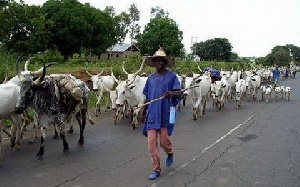The Ashanti Regional Director of MoFA, Mr. Kweku Mintah Fordjour, has bemoaned the lack of attention given to the country’s livestock sector, which to a large extent has contributed to the low investment in the livestock industry.
He said the livestock sector has over the years not received the needed attention that it ought to have been given. He backed this up by saying investment in the livestock sector has been extremely insignificant as compared to what goes into crop and allied sectors.
He said: “If you look at the investments that are made in agriculture as a whole and then you take out investment in the livestock sector, as a percentage of t investment in agriculture the livestock section pales into insignificance compared with what happens in the crop and allied sectors”.
He explained that one of the key outcomes of agriculture is food and food security, and maintained that food cannot be described as secure without ensuring a balanced diet. To achieve this, he emphasised, there must be sufficient animal protein as a food supplement; and so this makes it critical to food security.
Mr. Fordjour noted that the lack interest shown to the sector, along with other unresolved problems facing players in the industry, makes prospects for the sector gloomy.
He cited for instance the outbreak of bird-flu in the country, African swine-fever in pigs; in the recent past anthrax among others in cattle -- all of which, he observed, do not help build the livestock industry for business in spite of its enormous contribution to the Ghanaian economy.
He charged that stakeholders in the livestock industry should be up and doing, and support activities in the sector among others to attract the investment needed to reverse the industry’s declining stakes.
He recommended the development of communal grazing grounds, bailing crop residues into materials that can be used to feed especially ruminants livestock, particularly in the dry season, in a bid to tackle the perennial problems of herdsmen taking theiranimals to overgraze in cultivated farmlands.
The Ashanti Regional MoFA Director said these in an interview with the B&FT at the sidelines of the launch of the Ghana National Livestock Federation being facilitated by Trade Hub and African Partners Network, a project spearheaded by USAID and aimed at enhancing livestock trade within the sub-region.
The formation of the Federation, which is an inter-professional body made up of butchers, livestock farmers, traders and processors, is thought to help address some of the industry’s challenges as well as position Ghana to become part of the Federation of National West Africa Livestock Stakeholders (CONFENABVI).
Presently, member-countries of CONFENABVI number up to nine, including Benin, Togo, Cote d'Ivoire and Senegal. The remaining countries are Mali, Guinea, Niger, Burkina Faso and Ghana.
The creation of this regional body is intended to foster regional integration in the area of livestock trade, and also provide an opportunity to collectively seek ways to address challenges confronting livestock trade in the sub-region.
The Trade Hub improves capacity of West Africa’s farmers and firms in targetted regional and global value chains, and improves the business enabling environment by addressing transport constraints and trade barriers affecting efficiency of the region’s corridors and borders.
It works in close coordination with a network of West African private sector partners and public institutions; including Ministries of Trade, Ministries of agriculture, the economic Community of West African States (ECOWAS) and the West Africa Economic and Monetary Union (UEMOA).
It has a five-year target of ensuring US$102.5million in new investments facilitated in targetted sectors; 50% increase in the value of global and regional transactions for project-assisted firms; and creation of 23,000 new jobs for project-assisted firms.
Business News of Saturday, 27 June 2015
Source: B&FT
Investments in livestock sector poor
Entertainment












